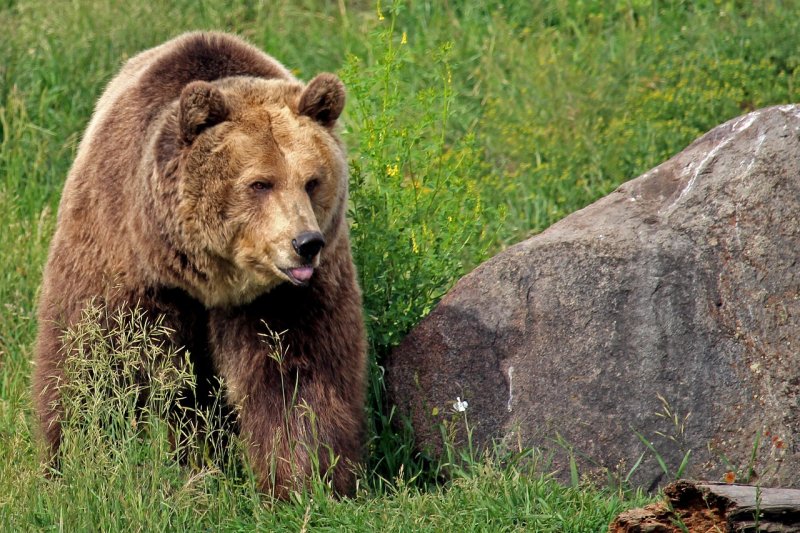1 of 3 | Several grizzly bears have been killed at bait sites that use human food intended to attract black bears in national forests. Photo courtesy of Max Pixel
DENVER, July 16 (UPI) -- Hunters luring black bears to "bait sites" loaded with bread, donuts and dog food on federal lands are putting endangered grizzlies and wolves at risk, critics say.
With the fall hunting season set to begin in August, conservationists say the hunting method to cull black bears also endangers grizzlies and wolves at the top of the food chain. Because the grizzlies and wolves are drawn to the bait sites, as well, they could fall victim to hunters or become nuisances in neighborhoods and have to be euthanized.
In June, conservation groups sued the U.S. Fish & Wildlife Service and the U.S. Forest Service, saying that protected grizzly bears near Yellowstone National Park in Wyoming were in danger of being attracted to the bait sites. The groups contend bait-hunting should not be allowed on U.S. Forest Service land.
Several grizzly bears have been killed at bait sites intended for black bears in national forests between the Greater Yellowstone ecosystem in Wyoming and the Bitterroot ecosystem in Idaho, according to the federal suit filed by WildEarth Guardians, the Western Watersheds Project and Wilderness Watch.
At last 10 grizzlies have been killed at black bear bait sites in the past decade, WildEarth Guardians attorney Peter Frost said.
Human bait sites can create "food conditioning" in grizzly bears and can "habituate grizzly bears to human sources of food and lack of fear of humans," said Scott Lake, Idaho director of Western Watersheds Project.
Grizzly bears are protected under the federal Endangered Species Act. The U.S. Fish & Wildlife Service estimates about 700 grizzlies live in the lower 48 states.
Human food used
Twelve states allow bait-hunting for black bears. The practice involves creating artificial feeding grounds with human food such as bread, donuts, dog food and popcorn. Hunters douse the ground around the site with grease, so bears' feet track the smells to the site. Some use bear-attractant sprays with names like "Bear-ly Legal."
Bears feed at the sites, where hunters hide downwind, waiting for a clear shot.
Some hunters object to the lack of sportsmanship in bear baiting, saying it violates "fair chase" hunting ethics and calling it "garbaging for bears" and "assassination." The majority of states, like Colorado, consider baiting of black bears poaching.
But those who participate in the hunt say they are helping the states with "predator management" of the 25,000 black bears in Idaho, some of which have become nuisances and have to be euthanized after being acclimated to living with humans and eating human trash.
"We get a lot of controversy and we get a lot of hate from a lot of people who don't understand all the work that goes into following regulations for baiting," said Garrett Bowen, co-owner of Idaho-based Top Priority productions.
Bowen and his colleagues, with licenses from the Idaho Fish and Game Department, hunt black bears at Idaho bait sites on private land and in national forests during "taking seasons" between April 15 and May 1, and again between August and October.
About 1,170 black bears were reported by the agency to be "harvested" by hunters at bait sites in 2016, the last year where numbers were reported online.
Baiting takes more work and costs more money than "spot and stalk" bear hunting, and has a higher rate of success, Bowen said.
For bow-hunters, baiting sites give you "a better opportunity to be up-close and personal with a bear," Bowen said. His group also hunts bears with guns. "We eat the meat; we utilize the whole body of the bear," he said.
Bears become "comfortable" with the human food at bait sites, and even stretch out on the ground while eating.
"What we're doing is 100 percent legal. There are no rules saying you can't shoot a bear lying down at a bait site," Bowen said.
He's never seen a grizzly at any of the company's Idaho bait sites, he said.
Lake, of the Western Watersheds Project, believes the U.S Forest Service should ban baiting on public forest land, even if it's allowed elsewhere in the state.
"If that garbage was on somebody's campsite in a national forest it would not be acceptable, but for some reason, if you're hunting a bear, it is," he said.
Wolves endangered
Hunting black bears with bait also harms another major predator -- wolves, conservationists say.
Wolves in Wisconsin follow other prey animals like deer and rodents that feed on the junk food at the black bear baiting sites in national parks such as the Chequamegon-Nicolet National Forest, said Rod Coronado of the conservation group Wolf Patrol.
Wolves and bear hunters come into conflict when juvenile bear hounds being trained in the national forests enter the wolves' territory during the midsummer wolf pup season. Hundreds of hounds have been killed by wolves during training season. Hunters often illegally retaliate against wolves, which are a federally protected endangered species.
"We don't want conflicts with dogs, because then the bear hunter turns into a wolf poacher," Coronado said. He points to bait-hunting as part of the reason that wolves kill hunting dogs.
Apart from causing conflicts between people and wolves, bear baiting goes against the "ethics of hunting," Coronado said.
"Bears are visiting the site because they can't wait for the free handouts. No ethical hunting tactics should alter the behavior of the prey."















